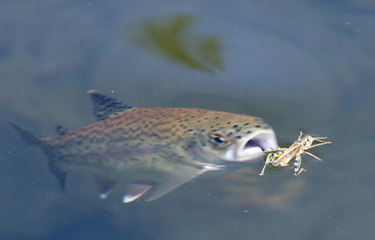The insect-protein industry has scaled production in recent years, and a growing number of new ventures have moved into the space. Advocates claim replacing fishmeal with insect meal is the key to sustainable aquaculture, but for a growing number of companies around the world, growing insects for use in fishmeal just makes good business sense.
In a recent virtual panel discussion hosted by F3 Future of Fish Feed, a collaborative effort between NGOs, researchers, and private partnerships founded in 2015 with the goal of accelerating the commercialization of alternative aquaculture feed ingredients, some of the world’s leading insect producers gathered to discuss the importance and future of insect-based aquafeed.
“I think that insects are one of the highest potentials for addressing the massive challenges in front of our food and agricultural landscape, and more broadly represent an enormous step forward in symbiosis with the biological systems on planet Earth,” said Patrick Crowley, the CEO of Salt Lake City, Utah, U.S.A.-based Chapul Farms, an edible insect company that recently pivoted from producing cricket flour for human consumption to producing meal for aquaculture and poultry.
“The insect agriculture industry is bookended by millions of years of R&D and product development in the form of thousands of species of insects. And they've been conducting field trials with, for example, rainbow trout for at least tens of thousands of years,” Crowley said during the webinar. “On the other hand, [insect-based aquafeed] is a very new industry in terms of the scaling of the animal husbandry and we're seeing incredible breakthroughs in real-time on maximizing production, breeding rates, and nutritional performance. Our systems’ design, therefore, tries to both respect the incredible work that nature has already provided us and builds around the natural life cycle of insects, while at the same time adapting to the latest advancements in the field.”
Also speaking at the webinar, Nutrition Technologies CEO and Co-Founder Nick Piggott said he became acutely aware of the challenges of food security while working for the United Nations in West Africa.
“It became obvious to me that industrial scale insect production is a potential solution,” Piggott said.
With Nutrition Technologies Co-Founder and COO Tom Berry, Piggott set up Nutrition Technologies in Johor Bahru, Malaysia due to its ideal climate for black soldier fly production and the region’s access to agro-industrial byproducts. The company’s first pilot facility was opened in March 2018 southern Malaysia, where it is beginning to ramp up its production to industrial scale. The company has announced plans to expand to Thailand, Vietnam, and Indonesia.
Dongen, The Netherlands-based Protix, is another company breeding insects to solve food system sustainability issues.
“Insects will take their rightful place in our food system,” Protix CEO and Founder Kees Aarts said. “We can deliver sustainable nutrition to further lower the footprints of very efficient species like chicken, shrimp, and fish. And that's what we do on a daily basis – focus on footprints, footprints, footprints, and to truly deliver on our vision of a food system in balance with nature.”
According to Aarts, for every kilogram of protein produced through insects, Protix takes more than four kilograms of CO2 out of the food system.
“This is our way of working towards a food system that demands less fishing for feeds, less land for food, and can provide circular nutrition for all,” Aarts said.
With promised lower carbon footprints, and lower costs, scalability is what’s keeping insect proteins from becoming the primary aquafeed ingredients worldwide, competing with established fishmeal products, and finding a place in existing food systems.
“I would say, thankfully, one of our biggest challenges is bandwidth,” Crowley said. “What's next for us is to just continue shedding the limitations of antiquated models of food production.”
Currently, Crowley said, insect products must be dehydrated to guarantee extended shelf-life, but if insect feed could be left partially hydrated through the expansion of regional food systems it would even greater benefits to the aquaculture market.
According to Alain Revah, the chief marketing and strategy officer of Evry, France-based insect protein company Ÿnsect, it’s only a matter of time before the insect protein industry is properly scaled and finds a prominent place in aquaculture.
“I don't think anybody today is going to replace fishmeal officially,” he said. “I think we can be complementary to fishmeal and fish oil – we can actually help them reduce the stress on the wild fish stock – initially. [The industry’s] production capability is low today, but it will increase rapidly soon. It's going to take some time for us to completely replace [fishmeal]. We may actually never be able to completely replace it given the size of the market globally, but there’s certainly a place for insect-based protein.”
Photo courtesy of Ÿnsect







